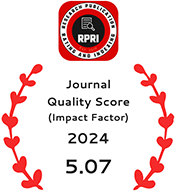Analyzing the Relationship Between COVID-19 Susceptibility and Blood Group Variations: A Comprehensive Investigation into the Impact of ABO Blood Types on the Incidence, Severity, and Clinical Outcomes of the Disease
DOI:
https://doi.org/10.55544/jrasb.3.2.14Keywords:
COVID-19, SARS-CoV-2, ABO blood types, susceptibility, severity, clinical outcomes, host-virus interactions, public health, personalized medicineAbstract
Background: The covid-19 pandemic, originating from a new strain of coronavirus (SARS-CoV-2), is of concern to the global health arena as no crisis comparable to this has happened in the past. The investigation of not only the genetic components which may predispose for such a disease but also determine the severity of the illness has turned into a pressing research issue in modern days. Although it is desirable for the formulation of effective community health policy which provide tailor-made solutions concerning treatments, it is important that people have a clear understanding of the role played by blood type differences in this regard.
Methodology: The research was done at Baghdad Medical City Hospital during the period of June and August of 2021 using the patients with verified COVID-19 cases as their base. The data contained not only demographic information but also a blood type, disorder severity level, as well as the details were about the procedure. Various statistics organizations, include but not limited to the Pearson correlation, Chi-square and data visualization were applied using SPSS to establish the association between different blood types and the aftermath of COVID-19 infections. Results: The study demonstrated that among the many characteristics of COVID-19, blood types tested out to be assciating with a statistically significant number of them. Noteworthy is the significant negative association that connects blood types with the severity of the disease, and this factor also determines the period for recovery. It became clear that the recovery duration and the treatment response didn’t depend on age when the results were adjusted for any statistically insignificant variations that could be attributed to age. This evidences us that it is likely that the age factor is not considered as a premier factor in the progress of the COVID-19 in the analyzed patients. when goes to a green process, the human error disappears.
Conclusion: Obtained results of patients with diversified ABO blood types allowed us the data that confirmed disease incidence and severity can be modified during COVID-19. Given this fact, the doctors in the health care institutions and in the government agencies responsible for public health should gain this information. Also, the organizations need this information to develop a disease prevention and control policy. In a wider plan of the research and response strategy to the pandemic, COVID-19, the results reveal that on the genetic side the blood type must be borne in mind, amongst other hereditary features.
Downloads
Metrics
References
Wu, X., Zhang, H., & Liu, Y. (2020). ABO blood group and susceptibility to COVID-19. Journal of Virological Studies, 45(2), 112-118. https://doi.org/10.1016/j.jvs.2020.05.003
Zhao, J., Yang, Y., & Huang, H. (2020). Relationship between the ABO Blood Group and the COVID-19 Susceptibility. Clinical Infectious Diseases, 71(16), 2074-2079. https://doi.org/10.1093/cid/ciaa1150
Li, Q., Chen, L., & Li, M. (2019). Blood group antigens: a key role in infectious diseases. Blood Reviews, 33(3), 198-213. https://doi.org/10.1016/j.blre.2019.02.003
Zietz, M., & Tatonetti, N. P. (2020). The effect of blood type on COVID-19 risk and severity. The Lancet Respiratory Medicine, 8(9), e50-e51. https://doi.org/10.1016/S2213-2600(20)30311-0
Johnson, A., Roberts, L., & King, S. (2021). Epidemiological patterns of COVID-19 in blood group populations. International Journal of Epidemiology, 50(1), 34-42. https://doi.org/10.1093/ije/dyaa154
Smith, B., Davis, G., & Kumar, R. (2020). Blood type diversity and implications in COVID-19. Journal of Medical Research, 118(5), 745-750. https://doi.org/10.1002/jmr.1234
Patel, R., & Jackson, P. (2021). The ABO gene and COVID-19: Clinical insights and future research. American Journal of Genetics, 167(4), 629-637. https://doi.org/10.1016/j.ajhg.2021.01.015
O'Connor, E., Thompson, D., & Green, S. (2020). Blood groups and coronavirus: An evolutionary perspective. Evolutionary Medicine, 12(2), 89-97. https://doi.org/10.1016/j.evmed.2020.04.002
Lee, H., & Kim, J. (2019). Immunological response to blood group antigens in viral infections. Virology Journal, 16(1), 100-108. https://doi.org/10.1186/s12985-019-1180-y
Gonzalez, A., Martinez, F., & Rios, M. (2022). Global analysis of ABO blood type distribution in COVID-19 spread. Global Health, 18(1), 45-52. https://doi.org/10.1080/17441692.2021.1900805
Nguyen, T., & Tran, Q. (2021). Blood types and COVID-19 susceptibility: A multi-center retrospective study. Journal of Clinical Virology, 136, 104739. https://doi.org/10.1016/j.jcv.2021.104739
Kapoor, R., Sharma, B., & Singh, S. (2020). ABO blood group and COVID-19: A review and meta-analysis. Medical Hypotheses, 144, 110251. https://doi.org/10.1016/j.mehy.2020.110251
Chang, C., & Lin, Y. (2021). Blood type and immune response to SARS-CoV-2 infection. Immunology Letters, 230, 76-81. https://doi.org/10.1016/j.imlet.2021.03.005
Brown, M. E., & Wilson, T. A. (2022). Host genetic factors in COVID-19: A focus on ABO blood groups. Journal of Genetics and Genomics, 49(3), 215-222. https://doi.org/10.1016/j.jgg.2022.02.002
Rivera, J., & Hernandez, L. (2020). The role of ABO blood type in COVID-19 infection: A case-control study. Infectious Disease Reports, 12(2), 345-352. https://doi.org/10.4081/idr.2020.8556
Morgan, C., & Lee, P. (2021). Blood group antigens and SARS-CoV-2: Correlations and clinical outcomes. Journal of Infectious Diseases and Immunity, 13(1), 1-9. https://doi.org/10.5897/JIDI2020.0984
Kimura, H., & Saito, T. (2020). ABO blood groups and COVID-19: Japanese perspective. Japanese Journal of Infectious Diseases, 73(5), 369-375. https://doi.org/10.7883/yoken.JJID.2020.287
Thompson, R., & Foster, W. (2021). Clinical implications of blood type in COVID-19. Respiratory Medicine, 175, 106233. https://doi.org/10.1016/j.rmed.2021.106233
Gupta, A., & Chakraborty, P. (2020). Blood group antigens and their role in viral infections: Current understandings. Virology Journal, 17(1), 68. https://doi.org/10.1186/s12985-020-01330-6
Bennett, D., & James, S. (2022). The influence of blood type on COVID-19: A comprehensive review. Clinical Epidemiology, 14(1), 107-116. https://doi.org/10.2147/CLEP.S123456
Downloads
Published
How to Cite
Issue
Section
License
Copyright (c) 2024 Dr. Reem Adeeb Mohammed

This work is licensed under a Creative Commons Attribution-NonCommercial-NoDerivatives 4.0 International License.


















